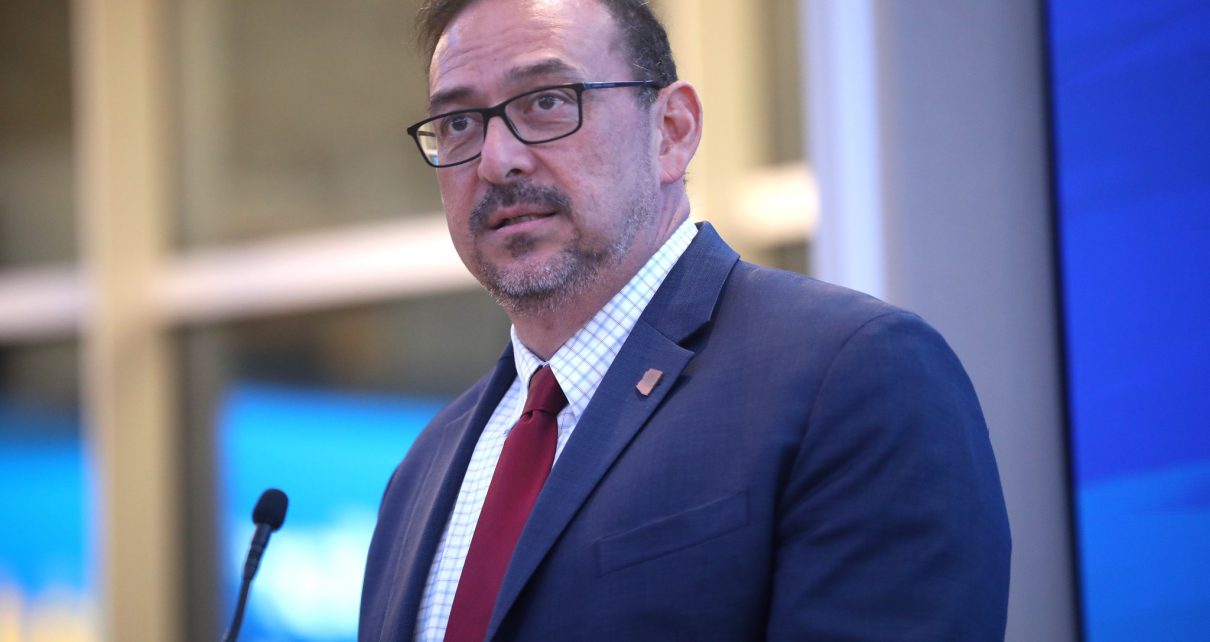
Arizona Secretary of State Adrian Fontes speaking at an event at the Thunderbird School of Global Management at Arizona State University in Phoenix, November 7, 2023. (Photo: Gage Skidmore)
Arizona’s Voter Roll Mess Threatens Election Confidence
CEC suing Arizona Secretary of State Adrian Fontes to clean up voter registrations
By Sara Frankenstein, June 26, 2024 5:00 am
Inaccurate voter rolls create mistrust in election outcomes. In Arizona, the Secretary of State has mismanaged statewide voter rolls to such an extent that it not only violates federal law but jeopardizes the integrity of the elections. That’s why the Center for Election Confidence (CEC) is supporting two Arizona voters, Scot Mussi, and Steven Gaynor, in their lawsuit against Arizona Secretary of State Adrian Fontes to compel him to maintain Arizona’s voter rolls as the law demands.
The suit, which relies on data from an independent analysis, shows that Arizona’s voter rolls include between 500,000 and 1.1 million individuals who should no longer be registered. These are voters who are either deceased, no longer residents of the state, or in some other way unaccounted for. Such discrepancies are alarming and create opportunities for ineligible people to cast ballots and dilute the votes of legitimate, eligible voters.
Federal law mandates that states maintain accurate and updated voter registration records. Specifically, Section 8 of the National Voter Registration Act (NVRA) requires states to conduct a general program to remove ineligible voters from official lists, including voters who have died or moved out of the state. However, Arizona’s current voter registration data indicates a significant lack of compliance with these federal requirements.
The lawsuit points to several counties—Apache, La Paz, Navajo, and Santa Cruz—where there are more registered voters than citizens over the age of 18. This is a clear indication that the voter rolls are inflated. Other counties also show voter registration rates between 80 and 99 percent, numbers that are implausibly high and suggest that many ineligible registrants remain on the voter rolls.
Statewide, an analysis provided by Thomas M. Bryan, an expert in demographic, economic, and electoral data, found Arizona had an overall voter registration rate of 96.7% in the 2022 midterm elections compared to the national average of 85.4%. Arizona’s “implausibly high” number of voter registrations isn’t a civic miracle. As the complaint states, “because the Secretary does not maintain accurate voter rolls, ineligible voters have an opportunity to vote in Arizona elections, risking the dilution of Plaintiffs’ legitimate votes.”
The implications of this mismanagement are profound. By failing to maintain accurate voter rolls, Arizona risks the integrity of its elections. Ineligible people on the voter rolls can lead to illegitimate ballots being cast, which in turn undermines public confidence in election results. This situation is exacerbated by Secretary Fontes’ apparent lack of action or concern. Despite repeated demands from the state legislature to clean up the voter rolls, Fontes has yet to present a clear plan to address the issue, each time saying, “it is in development.”
The lawsuit aims to compel Secretary Fontes to fulfill his duty under the law to maintain accurate voter registration records. This situation in Arizona is a stark reminder of the importance of diligent election administration. Voter rolls are more than just lists of names; they are foundational to the legitimacy of our elections. When these rolls are mismanaged, the very essence of democratic participation is at risk. Voters must be confident that their votes are counted accurately and that the electoral process is free from fraud.
The lawsuit, partially funded by the CEC on behalf of Arizona voters Mussi and Gaynor, is a crucial step toward cleaning up the state’s reckless mismanagement of its voter rolls. It seeks to ensure that federal laws are upheld and that Arizona’s elections are fair and transparent. The outcome of this case could set a significant precedent for how states manage their voter rolls, ultimately strengthening the democratic process.
ABOUT THE AUTHOR:
Sara Frankenstein serves on the Board of the Center for Election Confidence (formerly known as Lawyers Democracy Fund), a non-profit organization with a long history of advancing the role of ethics, integrity, and legal professionalism in the electoral process, including safeguarding the right of eligible voters to vote.
- Arizona’s Voter Roll Mess Threatens Election Confidence - June 26, 2024




